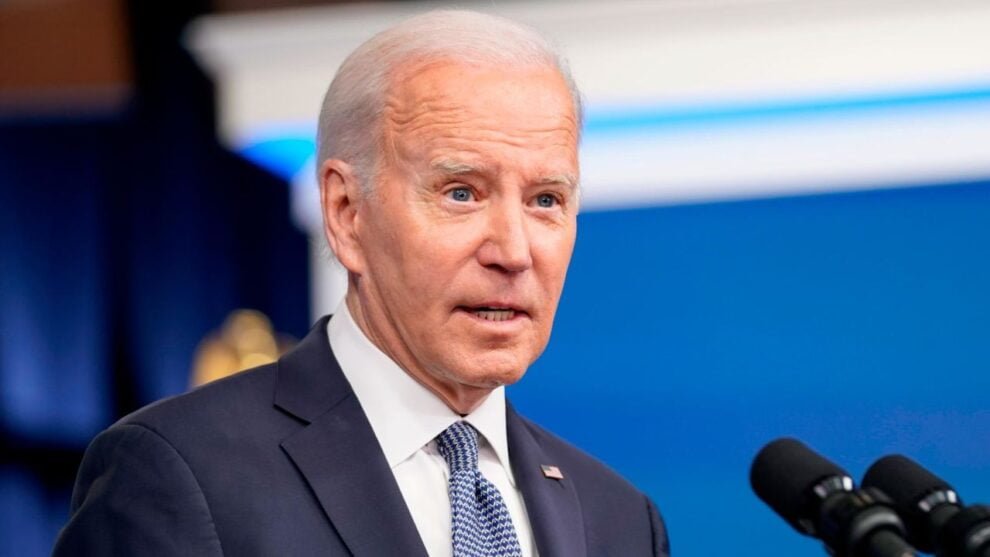BRUSSELS — There’s still more than a year to go before U.S. voters head to the polls, but at the heart of the European Union, officials are already racing to get as much as possible done before any potential change of leadership in the White House.
“There is unprecedented close cooperation and coordination between the EU and the current U.S. administration. It goes from official levels to the highest levels,” an EU official, who preferred to remain anonymous due to the sensitive nature of the situation, told CNBC.
“The EU is aware that this [cooperation] is not a given and such approach might change when there is someone like [former President Donald] Trump in the White House again. And the EU tries to use this momentum to advance [a] number of files, topics where there are shared interests,” the official added.
The EU, a group of 27 nations, was openly thrilled with the election of Joe Biden in late 2020 after four challenging years under the presidency of Trump, during which the trans-Atlantic relationship hit a low. The two sides had different views on trade, defense and technology — to name just a few points of tensions.
But there was a drastic improvement in relations the moment that Biden arrived at 1600 Pennsylvania Ave. His style and policy priorities were a lot more aligned with Brussels, including over how to deal with the coronavirus pandemic and climate change. This became ever more clear with Russia’s invasion of Ukraine, with European leaders welcoming the financial and military support from the largest economy in the world.
“The United States and the European Union have taken a strong and united stand against Russia’s illegal, unjustifiable, and unprovoked war against Ukraine,” European Commission President Ursula von der Leyen said in March alongside Biden in Washington, D.C.
″[Russian President Vladimir] Putin thought that he would divide us, and yet we are more united than ever. We stand together in our unwavering support for Ukraine for as long as it takes,” she added.
But it’s possible that the current agreement, and working practices, will all come to an end if there’s a new president in the White House.
“It will be a difficult relationship,” Kevin Klowden, chief global strategist at the Milken Institute, told CNBC over the phone in the scenario of a Republican candidate taking over the presidency.
“There’s a concern for Europeans that the U.S. will withdraw support [for Ukraine],” he said, adding that this is both military and financial aid.
The European Commission, the executive arm of the EU, was not immediately available for comment when contacted by CNBC.
The trans-Atlantic partnership remains essential for the EU.
EU Diplomat
Speaking to CNN earlier this month, Trump didn’t answer a question on whether he wants Russia or Ukraine to win the war, and did not commit to any backing for Kyiv if he did manage to win the presidency once again. He, however, claimed the conflict would end within 24 hours if he was back in charge.
Florida Gov. Ron DeSantis, who is expected to launch his bid for the 2024 presidential campaign later this month, has said he believes the U.S. shouldn’t get further involved in the Ukraine war.
“The trans-Atlantic partnership remains essential for the EU,” a European diplomat told CNBC, also speaking under the condition of anonymity due to the sensitive nature of the situation.
However, the same source said the relationship might look slightly different in the future anyway as Europe looks to become less reliant on other parts of the world — including both China and the U.S.
“The EU is developing its own path towards strategic autonomy, which doesn’t mean we are turning our back on our allies. On the contrary, it means we have to be more capable to be able to make our own choices,” the same diplomat said, adding this will continue regardless of who is in office at the White House.
There’s a realization in Europe that whoever is the next American president will naturally have U.S. interests in mind, which often don’t tally with what Europe wants. Proof of that was when the Biden administration, in spite of a close relationship, introduced unprecedented green subsidies which threatened the European economy. The U.S. Inflation Reduction Act, often shortened to IRA, left Europe blindsided and searching for concessions.
Meanwhile, EU-wide elections are due in June 2024 and officials in Brussels openly say that they have until the end of this year to complete policy actions. Officials believe they will not be able to pass new legislation from January onward with lawmakers focused on their election campaigns.
Source : CNBC












